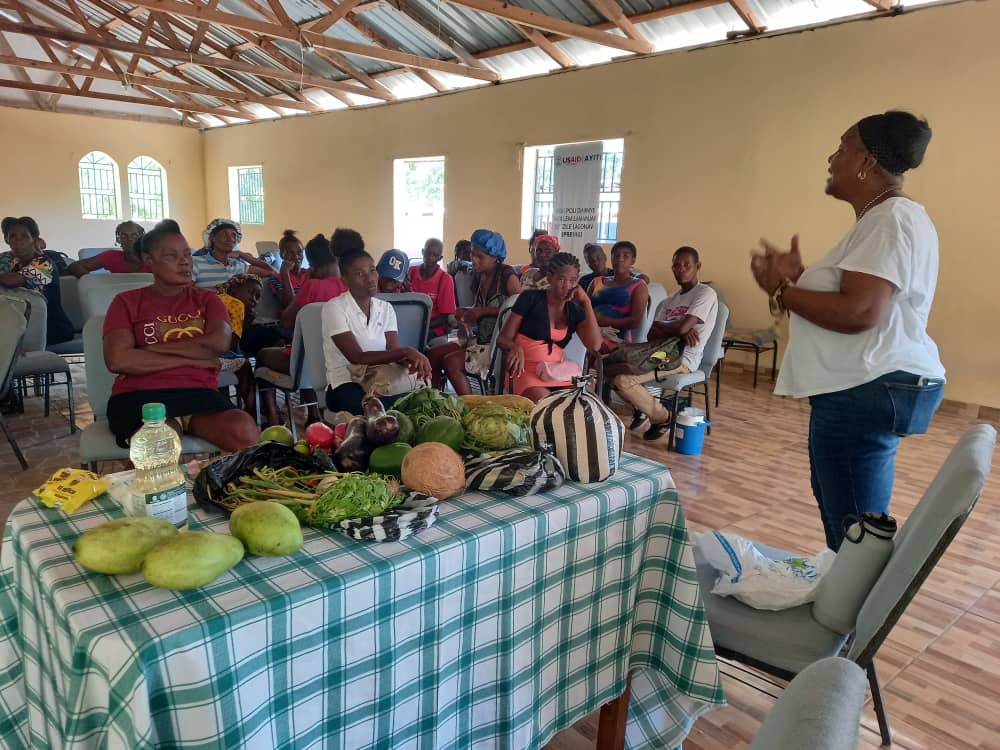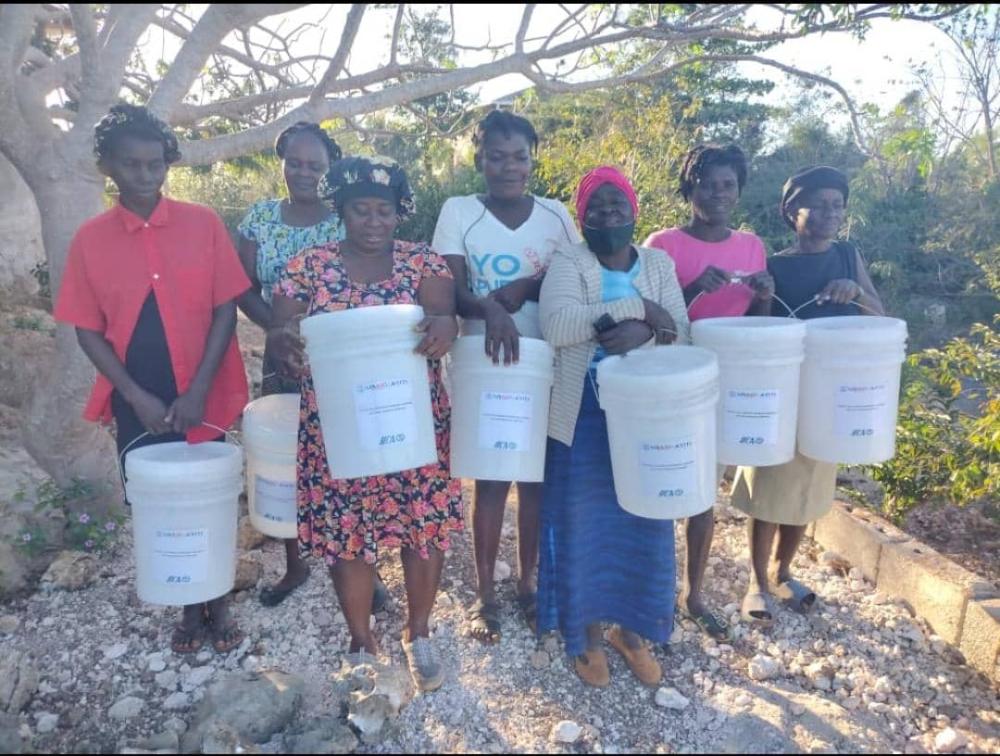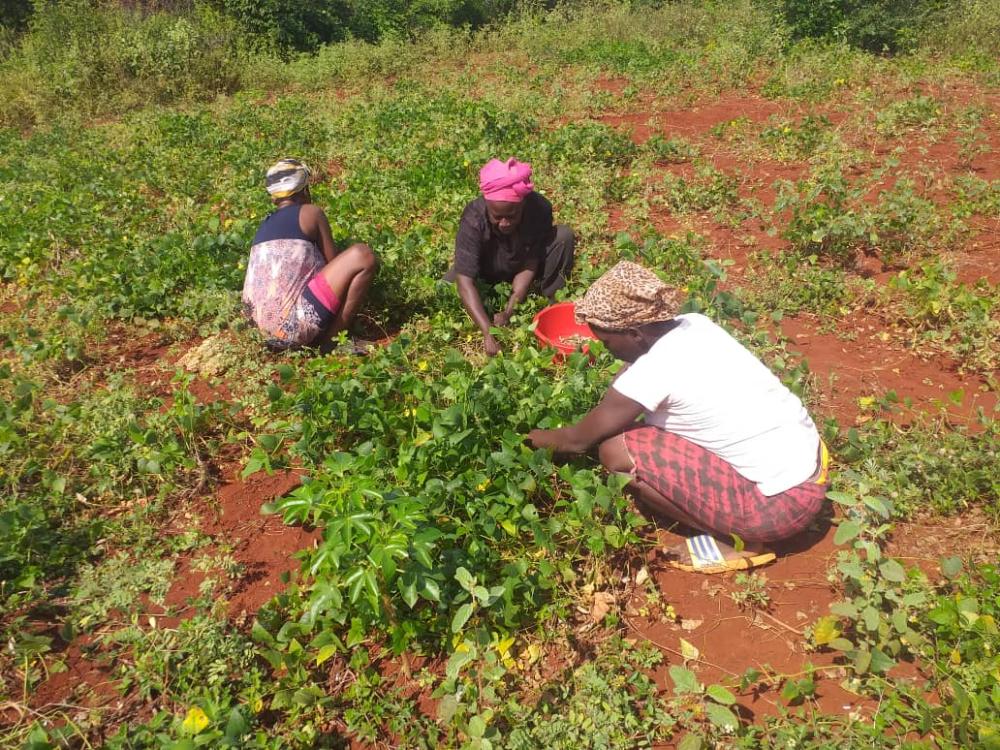The Inter-American Institute for Cooperation on Agriculture (IICA) works with the Ministry of Agriculture, Natural Resources and Rural Development of this Caribbean country, prioritizing actions in favor of food and nutritional security, agri-food safety, education and capacity building.

San José, 20 March 2024 (IICA) – In Haiti, both cities and rural areas are plagued with violence, and every day has become a battle for smallholder farmers.
For them, staying afloat in this troubled country, the poorest in the Americas and one of the three most vulnerable to the effects of climate change in the world, requires a tenacity that is inspired by the need to confront the food crisis that torments the population.
Scarcity of fertile soils, droughts and lack of access to water are just some of the many common challenges that Haitian family farmers face. Most of these farmers work in plant and animal production and must carefully protect their land for a very specific reason.
“In Haiti, small-scale farmers cannot fence their plots, and due to the drought, the animals must look for ways to meet their water needs. And this does not only affect their own animals, but also those of their neighbors, so every morning the farmers must go to their plots of land with their boys and girls and take turns to protect their farms, verify that their crops are healthy and undamaged, and do their work in the field manually,” explained Rachelle Pierre Louis, Technical Cooperation Coordinator of the Delegation of the Inter-American Institute for Cooperation on Agriculture (IICA) in Haiti.
The agricultural sector employs nearly two-thirds of the country’s economically active population, which is once again seeing an increase in the already extreme instability and political unrest, social violence, severe food insecurity, and lack of basic services such as electricity and drinking water.
In addition to this harsh reality, the critical dependence on rain to make the development of food production viable, mainly for self-consumption or for exchange in local markets, makes the work of farmers even more complex.
“If there is rain, the whole family prepares to grow their crops; if there is no rain, producers lose everything and must wait for the next rainfall. The life cycle of smallholder farmers is based on rain. As an example, in one of our cooperation initiatives we were unable to distribute seeds as a result of this situation” explained Pierre Louis

This cooperation project is called Food Vulnerability Reduction on La Gonave Island, and was implemented in the Anse-à-Galets and Pointe-à-Raquette communes, in the west of the country. It is currently in its second phase of execution and will reach 4,000 beneficiaries who will receive of food kits, 150 that will receive fruit seedlings, 1,000 farmers who will be provided sorghum seeds and 400 more who were trained in animal production.
With an investment of USD 1.5 million from the Bureau for Humanitarian Assistance of the United States Agency for International Development (USAID), this is the type of joint international cooperation efforts that IICA seeks to implement in Haiti in order to bring hope to this Caribbean nation and contribute to food and nutritional security.
“Haiti’s priority in the agricultural sector and other related sectors is food and nutritional security. It is the priority for the government and for the people, and constitutes a major challenge,” said the IICA specialist.
About 70% of Haitians depend on agriculture, which consists mainly of small-scale subsistence agriculture.
Ongoing cooperation, a driver of hope
IICA works hand in hand with the Ministry of Agriculture, Natural Resources and Rural Development in terms of technical assistance, prioritizing food and nutritional security with a humanitarian approach, and on issues such as agri-food safety, education and development of technical capacities with the human resources of the ministry, and with agronomists, producers, agribusinesses and rural leaders.
“IICA is providing a wide range of cooperation services to the Ministry, given that the NGOs with a presence in the country generally do not have ongoing activities in the field,” commented the IICA Technical Cooperation Coordinator in Haiti.
“We dedicate many efforts to training human resources and improving their work in the field. Education is not only for them; it is provided to partners, business owners, agronomists, and agricultural schools. Any activity or project (carried out in consortiums) has an education component, including sessions with producers, committees, and leaders in the field. This is a priority because human resources in Haiti are leaving, many people migrate due to the situation of insecurity in the country, and this leads to the need to train new people,” added Rachelle Pierre Louis.

In 2023, IICA assisted in preparing the designated representative of the Ministry of Agriculture for his participation in the United Nations Conference on Climate Change (COP28) in the United Arab Emirates.
“We are also working on food safety with the Safety Unit of the Ministry of Agriculture, identifying the best way to move forward in coordination with the Ministry of Health. This takes time, but it is necessary, as in the coming years the country will need to export a lot to generate resources, and we cannot do this without food safety,” said Pierre Louis.
IICA has made significant contributions in the past five years in this Caribbean nation, including the agricultural financing policy and the introduction of the profession of management advisor through the training of 24 Advisors in Technical Management (ATM), in support of Haiti’s agricultural financial system.
The Delegation also co-organized trainings on agricultural entrepreneurship and governance for agribusinesses and farmers’ associations in the North and South of the country; collaborated with the World Bank in the publication of the document Nutrition smart agriculture in Haiti to improve awareness of agricultural nutrition, and provided training in food safety, hygiene and information and communication technologies to members of local organizations in the departments of Sur and Grand’Anse in the context of the Agrodigitalization Project, in collaboration with Agriterra and with financing from the International Fund for Agricultural Development (IFAD).
Finally, within the framework of the Ministry of Agriculture’s Agricultural and Agroforestry Technological Innovation Program, financed by the Inter-American Development Bank (IDB), IFAD and Global Agriculture and Food Security Program, the IICA delegation with the Tropical Agricultural Research and Teaching Center (CATIE). carried out 108 training sessions on eight topics, with a view to strengthening the capacities of suppliers of agricultural goods and services to support farmers.
The goal of these initiatives is to promote resilience among small Haitian producers, who despite their current context and reality continue to work hard to overcome adversity and contribute to food security and sustainable development in their communities.
More information:
Rachelle Pierre Louis, IICA Technical Cooperation Coordinator in Haiti.
rachelle.pierrelouis@iica.int











